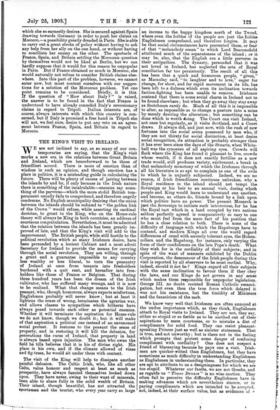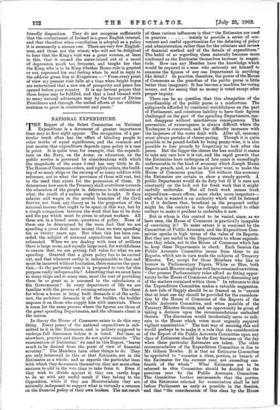THE KING'S VISIT TO IRELAND.
WE are not inclined to say, as so many of our con- temporaries are saying, that the King's visit marks a new era in the relations between Great Britain and Ireland, which are henceforward to be those of friendliest accord. There is more of emotion than of wisdom in such an opinion, and though emotion has a place in politics, it is a misleading guide in calculating the future. There will be plenty of causes of jarring between the islands by and by, if only because in the Irish nature there is something of the incalculable—enemies say some- thing of the perverse—which the more stolid British tem- perament usually fails to comprehend, and therefore angrily condemns. No English municipality desiring that the union between the islands should be reduced to " the golden link of the Crown " would refuse, while asserting its cardinal doctrine, to grant to the King, who on the Home-rule theory will always be King in both countries, an address of courteous congratulation. Nevertheless, it must be admitted that the relation between the islands has been greatly im- proved of late, and that the King's visit will add to the improvement. The British people, while still hostile to the political revolution which so many Irishmen desire, have been persuaded by a lenient Cabinet and a most adroit Secretary for Ireland to provide the means for carrying through the social revolution. They are willing, through a grant and a guarantee impossible to any country less wealthy or less liberal, to turn the peasantry of Ireland at once from tenants into freeholders burdened with a quit rent, and hereafter into free- holders like those of France or Belgium. That during three hundred years has been the dream of the Irish cultivator, who has suffered many wrongs, and it is now to be realised. What that change means to the Irish peasant, who, though humorous, always expects misfortune, Englishmen probably will never know ; but at least it lightens the sense of wrong, terminates the agrarian war, and allows classes to sympathise which hitherto have always posed towards each other as potential enemies. Whether it will terminate the aspiration for Home-rule we do not know, though we doubt it ; but it will make of that aspiration a political one instead of an envenomed social protest. It restores to the peasant the sense of property, and in restoring it will kill the delusion, for generations the curse of Ireland, that property in land is always based upon injustice. The man who owns the field he tills believes that it is his of divine right. His place is his own, and if the climate allowed of vines and fig-trees, he would sit under them with content.
The visit of the King will help to dissipate another painful delusion. The Celtic Irish, who, like all other Celts, value honour and respect at least as much as prosperity, have always fancied themselves looked down upon. They have never, owing to their want of minerals, been able to share fully in the solid wealth of Britain. Their island, though beautiful, has not attracted the sportsman and the tourist, who every year carry so large an income to the happy kingdom north of the Tweed, where even the foibles of the people are just the foibles Englishmen comprehend, and therefore forgive. It may be that social circumstances have prevented them, or fear of that " melancholy ocean " to which Lord Beaconsfield attributed much of the separateness of the island ; or it may be, also, that the English are a little perverse in their antipathies. The dynasty, persuaded that it was not loved in Ireland, has neglected the arts of Royal conciliation far too persistently. The result of all this has been that a quick and humorous people, " given," as Macaulay said, " to laughter and to love," eager fox. change, for show, and for rapid movement in its life, has been left to a dulness which even its inclination towards faction-fighting has been unable to remove. Irishmen contend that there is some social charm in Ireland not to be found elsewhere ; but when they go away they stay away as Scotchmen rarely do. Much of all this it is impossible to alter, as impossible as to change a pasture into a mine by merely desiring the alteration ; but something can be done which is worth doing. The Court can.visit Ireland, not once but regularly,. as it visits Scotland, and a Court draws. It always did, and just now, with the rush of new fortunes into the social arena possessed by men who, if they are not thirsty for social distinction, at least desire social recognition, its attraction is probably stronger than it has ever been since the days of the Stuarts, when White- hall was the cynosure of all aspiring eyes. Crowds will flock where the King has found it pleasant to live, crowds whose wealth, if it does not exactly fertilise as a new trade would, still produces variety, excitement, a break in that melancholy monotony of which the Irishman through all his literature is so apt to complain as one of the' evils to which he is unjustly subjected. Indeed, we see no reason, if Irish friendliness continues unbroken, why a Royal residence in the island should not tempt the Sovereign or his heir to an annual visit, during which people and King would learn to understand one another, and become, as others do, friends bound by a link upon which politics have no power. The present Monarch is just the Sovereign to initiate such intercourse, for he has the Royal tact which in a land occupied by two nations seldom perfectly agreed is comparatively so easy to one who must feel from the mere fact of his position that he has a close relation to both. There is none of the difficulty of language with which the Hapsburgs have to contend, and modern Kings all over the world regard differences of creed with serenely tolerant eyes, the Hohen- zollern and the Hapsburg, for instance, only varying the form of their condolences on the late Pope's death. What they wish for is the cordiality of their subjects ; and in spite of the want of manners exhibited by the Dublin Corporation, the demeanour of the Irish people during this visit is reported by all observers to be most cordial. Why, indeed, should it not be ? Kings .regard all their subjects with the same inclination to favour them if they obey the laws, and our Kings do not govern in any sense which makes them responsible for unpopular legislation. George III. no doubt resisted Roman Catholic emanci- pation, but even then the true force which delayed it was not his resistance, but the timidity of Ministers and the fanaticism of the mob. • We know very well that Irishmen are often annoyed at the undue importance which, as they think, Englishmen attach to Royal visits to Ireland. They are not, they say, either so stupid or so feeble as to be soothed out of their aspirations by mere courtesies, or to mistake a diet of compliments for solid food. They can resist pleasant- speaking Princes just as well as sinister statesmen. That is true, and not unworthy ; but is there not in the feeling which prompts that protest some danger of confusing compliment with cordiality ? One does not suspect a friend of blarneying because he pays one a visit. Irish- men are quicker-witted than Englishmen, but they have sometimes as much difficulty in understanding Englishmen as Englishmen in understanding them. In particular, they are apt to attribute to us a designingness for which we are too stupid. Whatever our faults, we are not Greeks, and as regards us " Timeo Danaos " is no wise caution. They often fail to perceive the difficulty Englishmen have in making advances which are nevertheless sincere, or in paying compliments which are intended to be accepted. not, indeed, at their surface value, but as evidences of A friendly disposition. They do not recognise sufficiently that the contentment of Ireland is a great English interest, and that therefore when conciliation is adopted as a policy it is necessarily a sincere one. There are very few English- men, and those not the wisest, who will not be delighted to hear that the King's visit was a great success, at least in this, that it roused the sister-island out of a mood of depression much too frequent, and taught her that the King, who is to be King whether Home-rule is granted or not, expressed his real feeling when he said in reply to the address given him at Kingstown :—" From every point of view my present visit falls at a time when bright hopes are entertained that a new era of prosperity and peace has opened before your country. It is my fervent prayer that these hopes may be fulfilled, and that a land blessed with so many natural advantages may by the favour of Divine Providence and through the united efforts of her children continue to grow in contentment and peace."







































 Previous page
Previous page